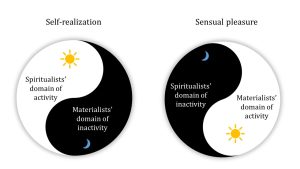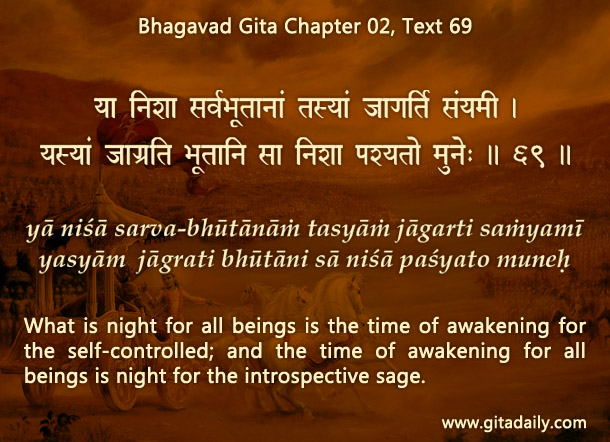
Literally, the verse states: what is night for all living beings is the time of awakening for the self-controlled; and the time of awakening for all living beings is seen as night by the sages.
This verse underscores the Bhagavad-gita’s poetic nature, which is often forgotten or neglected while contemplating its philosophical message. Poetry frequently features literary devices, which add both beauty and complexity to the writing. Here, the literary device of a metaphor, or more precisely an extended metaphor, is used throughout the verse so that its actual meaning is far deeper than and different from the literal meaning.
Intriguing though the verse sounds, it seems incoherent — day and night don’t differ for different categories of people. Might the verse refer to two categories of people who live in time zones that are twelve hours apart so that their times of sleeping and waking are opposite? Unlikely, because the Gita neither mentions time zones nor indicates even remotely that people’s life-orientation — spiritual or otherwise — is determined by their time zones.
If we seek the verse’s essential meaning with the guidance of time-honored Gita commentators, we discover that it discusses the difference between spiritualists and most other living beings, who tend to be materialists. Herein, night connotes darkness, which in turn suggests lethargy, indifference, incomprehension; whereas the time of awakening or daytime connotes light, which in turn suggests energy, interest, insight. Thus, night and day refer not to time durations, but to domains of inactivity and activity respectively. The domains of self-discipline and self-realization are of little interest to materialists, who often dismiss such pursuits as impractical, irrelevant, irrational. But those domains are life’s primary purpose for spiritualists, who hold that these pursuits alone infuse life with enduring meaning and fulfilling purpose. In contrast, the domains of sensual indulgence and worldly opulence are life’s primary business for materialists, who see these pursuits as life’s best, if not only, pleasure. But those domains are of little interest to spiritualists, who see such pursuits as causes of distraction, if not degradation.
One-sentence summary:
Gita 02.69 highlights the difference between spiritualists and materialists by using the arresting metaphor of night and day to convey their opposing domains of activity.
Think it over:
- How does Gita 02.69 underscore an oft-overlooked aspect of the Gita?
- Why can this verse not be understood literally?
- What is the verse’s essential meaning?
***
02.69: What is night for all beings is the time of awakening for the self-controlled; and the time of awakening for all beings is night for the introspective sage.
To know more about this verse, please click on the image


GOD has no time zones